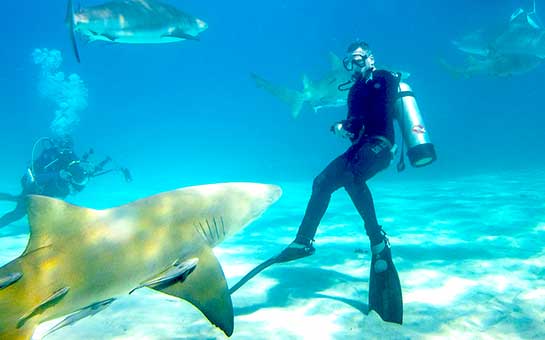Have you ever dived with sharks? If you love a good adrenaline rush, then shark diving will be right up your alley. Swimming with sharks is not for the faint-hearted. But surprisingly, thousands of people across the world dive regularly with these majestic predators.
Shark attacks are a relatively rare incident, but the occasional injuries need intensive medical care. Covering yourself with shark-diving travel insurance will ensure that, in case of an accident or injury, you won’t be fully responsible for the hefty medical bills.
Travel Insurance for Shark Diving
Shark diving travel insurance can cover your medical bills in case of any injuries. The medical bills related to adventure sports tend to be quite high in most countries. But extreme sports travel insurance can cover those without you having to worry. Standard travel insurance plans do not include coverage for hazardous activities like diving with sharks. Be sure to cover yourself with shark diving travel insurance before you go swimming with the sharks.
Introduction to Shark Diving
Sharks are fascinating creatures. They inhabit an exotic underwater world as the apex predators. Since the 1950s, shark diving has become increasingly popular. The thrill of seeing something so dangerous up close is exhilarating. Sharks do not typically hunt humans. But they will take a bite out of curiosity if they can't see you clearly or when they are in a feeding frenzy.
Shark diving became a popular tourist attraction after the invention of the shark cage, a metal cage suspended underwater. Tourists and shark enthusiasts can observe sharks swimming around them from within the safety of the cage. Sometimes, bait is used to draw the sharks closer-however, baiting makes the sharks more aggressive as they come expecting food.
Scuba diving without a shark cage gives you more flexibility and range of motion. It also lets you approach the larger species, like whale sharks. Despite being the largest known fish in the ocean, whale sharks are harmless. You can scuba dive and swim beside these gentle giants unhindered. But not all sharks are as friendly. Make sure to always dive in small groups to minimize the chances of a shark attack.
Despite all precautions, shark diving remains a hazardous sport. But you can avoid the financial strain from any possible injuries with hazardous sports travel insurance that covers diving with sharks.
Risks of Shark Diving
Sharks generally do not attack divers, but their behavior is changing due to excessive baiting. In popular shark tourism locations, sharks have begun to associate the boats with food. They have grown bolder and can swim in quite close to the diving boat.
Needless to say, a bite from those sharp teeth would cause grievous damage. But if you follow your instructor's lead, they will pass you by. Most sharks hunt during the evening and dawn, so try to avoid diving during that time. And do not dive into muddy water. Poor visibility confuses the sharks, and they might mistake you for something it usually eats.
Besides the risks of a shark attack, there is the additional danger of equipment failure. Scuba diving, even without the sharks, is a risky venture. Double-check your gear, and always dive with a companion or instructor.
Before you go diving with sharks, cover yourself with adventure sports travel insurance. In case of an accident, it will protect your finances by covering the medical bills no matter which country you are in.

